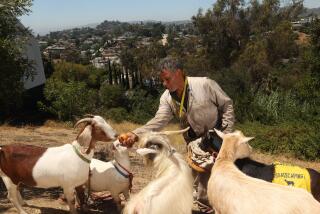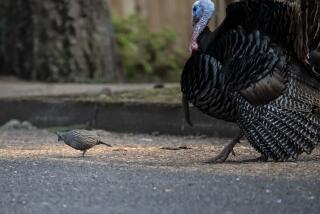Limited Range : Even the Trendiest of Turkeys Don’t Seem to Understand
Gary Lee of Lockwood Valley doesn’t understand all the fuss about “free-range” fowl, which fetch higher prices because the birds supposedly get more room to roam the barnyard.
Like any turkey farmer worth his cranberries, Lee knows that the wily gobblers bunch together no matter how much room they’re given.
On cold nights, “we have to keep separating them till the sun gets up so they don’t smother,” said Lee, 35, whose family has raised unofficial “free-range” turkeys for 59 years, long before the fad hit trendy restaurants.
There are plenty of cold nights at Lee Ranch, in the remote northeast corner of Ventura County. Last week, the mile-high mountains of Lockwood Valley in the Los Padres National Forest were capped with the season’s first snow, and the temperature hovered at 35 degrees.
But the turkeys don’t seem to mind. Since 1929, when Lee’s grandparents hatched 50 poults (baby turkeys) in the living room of their log cabin, the Lee operation has expanded into a thriving business that brings 100,000 turkeys to market each year.
That makes them one of the largest--and only--turkey ranches in Southern California, according to the California Turkey Advisory Board.
“Any operation that’s growing 100,000 turkeys south of the Tehachapis is a pretty sizable outfit,” said Mervin Amerine, manager of the California Turkey Industry Board. He said most California birds are raised in the San Joaquin Valley near turkey processing plants and feed mills.
And indeed, the Lees have a second turkey ranch in Tranquility, 30 miles west of Fresno, where Lee’s 31-year-old brother, Brian, raises 200,000 birds annually to meet demands of the expanding turkey market. This year, that market is expected to gobble up 246 million birds, according to the National Turkey Federation.
Americans will eat 16.5 pounds of turkey each this year, more than twice what they consumed in 1970. And after years of hunting and pecking to make ends meet, the Lees say the turkey industry has blossomed into a relatively profitable business.
Bert, Louella and their son Gary Lee say they also benefit from a contract with Zacky Farms, which minimizes their risk. Zacky, a large poultry company, delivers 1-day-old poults to the 75-acre Lockwood Valley ranch and picks them up 15 to 18 weeks later as 16- to 30-pound grown turkeys.
Zacky also provides as much as 25 tons a day of protein meal, about 1.5 pounds of feed per turkey. It’s up to the Lees to deliver healthy, plump birds to market.
And when wrestling with 30-pound toms with dubious IQs, that can sometimes be a difficult task.
Turkeys are inquisitive, gregarious creatures, so curious that hundreds have smothered one another rushing to identify a mysterious noise.
And at the Lee Ranch, they grow so fat from selective breeding and constant eating that when blown on their backs by the fierce Lockwood Valley winds, they have occasionally frozen to death, unable to struggle back to their feet.
Then there is the matter of fighter pilots from Edwards Air Force Base north of Lancaster or George Air Force Base near Victorville, who sometimes swoop down into the valley as low as 500 feet on test maneuvers.
“It spooks them good. They think it’s a hawk,” said Louella Lee, who keeps the books at the turkey ranch and collects turkey memorabilia. The comfortable ranch-style house where she and her husband live is lined with turkey art (painted gobblers carved out of pine cones), turkey kitchenware (a silver turkey serving plate and matching salt and pepper shakers) and turkey decanters (Wild Turkey liquor bottles with outdoor scenes on them).
While they don’t treat them as pets, the Lees frown upon anything that spooks their turkeys. For one, stress keeps the birds from gaining weight. And it might cause them to smother one another in a rush to avoid a noise. Even wearing a different color shirt (turkeys particularly dislike red) can agitate the birds and raise their blood pressure.
Occasional near-brushes with disaster also send the blood pressure of the Lees soaring.
Two years ago, a forest fire came within a mile of the ranch and threatened to turn the Lee birds into enough turkey fricassee to feed a large city.
Another time, the Lees caught a turkey rustler making off with a bird under each arm. Instead of pressing charges, they agreed to let the man work off his crime by spending 3 days helping out on the ranch.
Each year, coyotes kill a handful of turkeys, and bighorn owls screech down and carry off several more. In one of their worst years, the Lees lost 1,800 birds to bad weather, predators and accidents.
For the first 6 or 7 weeks of their short lives, however, the baby turkeys are kept indoors in big, barn-like brooders lined with shavings and heat lamps. During this time, the entire Lee family, including Gary Lee’s 12-year-old daughter, Jennifer--a fourth-generation turkey rancher--helps hand-feed the chirping poults.
After almost 2 months, the birds are herded into outdoor corrals where they can theoretically range free. The Lees use burlap bags, which they flick noisily at the turkeys, and two big Labrador-mix dogs named Sandy and Pudwell who pant paternally after the birds and herd them along like sheep.
“Pudwell runs back and forth, pushing them with his nose and nipping them on the neck,” Gary Lee said. “One time, we caught him herding about 20 of them out of a pen and 30 feet away, probably accumulating them for a later meal,” he said, laughing.
Each week, a Zacky Farms employee drives out to Lockwood Valley to weigh a sampling of turkeys and check on their progress.
By today, when most Americans are sitting down to a roasted bird, the only sign of turkey left on Lee Ranch and for 10 miles back along Lockwood Valley Road to Interstate 5 is a trail of white feathers.
And the Lees?
They’re sitting down to Thanksgiving dinner, too. They might even be eating one of their own birds.
“We buy them oven-ready from Zacky’s,” Louella Lee said. “They give us a price break.”
More to Read
Sign up for Essential California
The most important California stories and recommendations in your inbox every morning.
You may occasionally receive promotional content from the Los Angeles Times.










